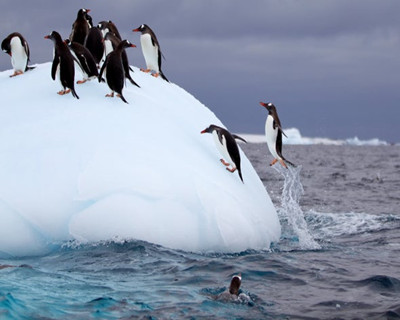(单词翻译:单击)
听力文本
This is Scientific American's 60-second Science, I'm Christopher Intagliata.
Antarctica is known for its great expanses of white—and not just snow.
"If it's fresh it might be white or pinkish, and eventually it all turns brown, muddy brown."
Stef Bokhorst is an ecologist at Vrije University in Amsterdam, and the initially white stuff he's talking about is penguin poop.
"The first thing you notice of it is the smell. Basically you're squishing through puddles, what you first think is mud, but it's actually just poo. And that produces that really strong ammonia smell you can really smell from miles away."
But it’s not just the smell that travels on the wind. Ammonia contains nitrogen—a valuable fertilizer—so the winds carry nourishment to nearby mosses and lichens. That, in turn, supports teeming communities of the largest fully terrestrial animals in Antarctica: invertebrates like springtails and mites.

Bokhorst and his colleagues took air and plant samples around the poop piles and found this airborne ammonia fertilizer enriches life as far as a mile away. The full details are in the journal Current Biology.
And the work makes it easier for scientists like Bokhorst to remotely estimate Antarctica's biodiversity. "We don't have to go to all of these field sites—we can actually basically sit at home, take all these pictures with satellites, and then get an idea where the highest biodiversity should be along the peninsula."
Of course, doctors have long taken a stool sample to get medical information about a patient, and now ecologists will be able to use imagery to track feces and predict its beneficial effects at the bottom of the world. In short: don't poo-poo the poo.
Thanks for listening for Scientific American — 60-Second Science. I'm Christopher Intagliata.
参考译文
这里是科学美国人——60秒科学系列,我是克里斯托弗·因塔格里塔。
南极洲以其广袤的白色而闻名,这种白色不仅仅是雪。
“如果是新鲜的,那可能呈现白色或浅粉色,不过最终都会变成棕色,暗棕色。”
阿姆斯特丹自由大学的生态学家斯代夫·博克霍尔斯特说到,他前面谈到的那个白色东西是企鹅的粪便。
“你最先注意到的是它的味道。在吱嘎吱嘎地穿过水坑时,你以为你踩到的是泥,但实际上是粪便。它会产生非常强烈的氨气味道,几英里外都能闻到。”
但随风传播的可不仅仅是气味。氨中含有氮,而氮是一种非常有价值的肥料,因此风会将营养物质吹到附近的苔藓和地衣那里。这反过来供养了南极洲最大的完全陆生动物群落:跳虫和螨虫之类的无脊椎动物。
博克霍尔斯特和同事提取了粪堆周围的空气和植物样本,他们发现这种通过空气传播的氨肥甚至支持了一英里以外的生命。完整细节发表在《当代生物学》期刊上。
这项研究使博克霍尔斯特这样的科学家能更容易地远程估算南极洲的生物多样性。“我们无需前往所有现场,我们可以坐在家中,用卫星拍下所有这些照片,然后就能了解半岛沿岸生物多样性最高的地方在哪里。”
当然,医生长期以来一直通过粪便样本来获取患者的医学信息,现在,生态学家将有能力用图像来追踪粪便,并预测其在世界底部的有益影响。简而言之:不要拒绝便便。
谢谢大家收听科学美国人——60秒科学。我是克里斯托弗·因塔利亚塔。
译文为可可英语翻译,未经授权请勿转载!
重点讲解
重点讲解:
1. be known for 以…闻名的;
The French are known for their love of their language.
法国人热爱自己的语言是出了名的。
2. in turn 继而;转而;反过来;
That, in turn would increase pressure for higher wages and that, in turn, would impact on inflation and competition.
那样就会增加工资上涨的压力,而那样又会对通货膨胀和竞争产生影响。
3. be able to do sth. 可以…的,能够…的;
They may be able to help with childcare so that you can have a break.
他们可以帮忙照料孩子,这样你就可以歇一歇了。
4. in short 总之;简而言之;
Try tennis, badminton or windsurfing. In short, anything challenging.
试试网球、羽毛球或帆板运动吧。总之,只要是有挑战性的。


